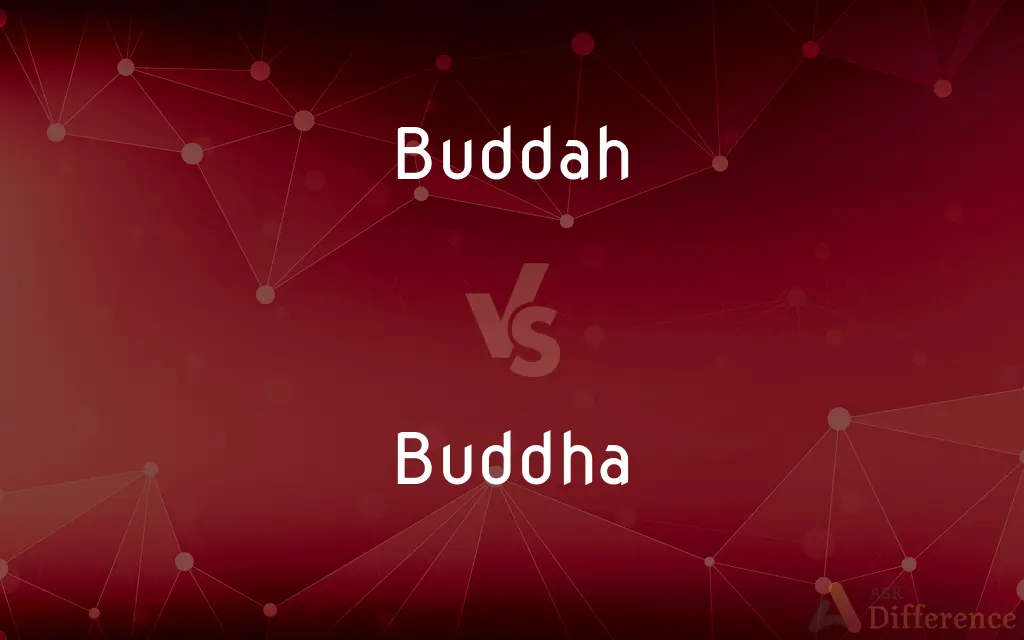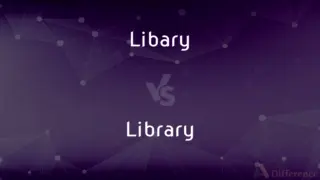Buddah vs. Buddha — Which is Correct Spelling?
Edited by Tayyaba Rehman — By Fiza Rafique — Updated on March 29, 2024
"Buddah" is an incorrect spelling; the right spelling is "Buddha," referring to the founder of Buddhism or an enlightened being.

Table of Contents
Which is correct: Buddah or Buddha
How to spell Buddha?

Buddah
Incorrect Spelling

Buddha
Correct Spelling
ADVERTISEMENT
Key Differences
Just like the middle path in Buddhism, stick to the middle 'hh' in "Buddha."
Remember the 'hh' for the heightened state of enlightenment.
Associate "Buddha" with the traditional representations in art; authenticity is in the correct spelling.
Think of the word 'huddle'; just as two 'd's follow a single 'h', in "Buddha", two 'd's precede a double 'h'.
Buddha is also pronounced with a clear 'hh' sound, which can serve as a cue.
ADVERTISEMENT
How Do You Spell Buddha Correctly?
Incorrect: Buddah was sitting under the Bodhi tree.
Correct: Buddha was sitting under the Bodhi tree.
Incorrect: Artifacts related to Buddah are considered sacred.
Correct: Artifacts related to Buddha are considered sacred.
Incorrect: Many people follow the teachings of Buddah.
Correct: Many people follow the teachings of Buddha.
Incorrect: The story of Buddah is well known across many cultures.
Correct: The story of Buddha is well known across many cultures.
Buddha Definitions
Buddha can describe someone who has attained Buddhahood, the highest spiritual state in Buddhism.
The statue represents a Buddha in meditation.
A Buddha is any person who has attained full enlightenment.
In Buddhism, many believe that there were Buddhas before Gautama.
Buddha is often used to refer to a representation or statue of the enlightened being.
The temple houses a giant golden Buddha.
The teachings of the Buddha are foundational texts in Buddhism.
Followers seek to live by the principles set by the Buddha.
One who has achieved a state of perfect spiritual enlightenment, thereby attaining nirvana.
A representation or likeness of a Buddha.
A human being who has become enlightened. (in Buddhism)
A statue or image of the Buddha.
Marijuana
The title of an incarnation of self-abnegation, virtue, and wisdom.
Founder of Buddhism; worshipped as a god (c 563-483 BC)
One who has achieved a state of perfect enlightenment
Buddha refers to Siddhartha Gautama, the founder of Buddhism.
Prince Siddhartha became the Buddha after achieving enlightenment.
Buddha Meaning in a Sentence
The statue of Buddha in the temple was very large.
Many stories about Buddha include lessons about kindness.
The teachings of Buddha have spread across the world.
Followers of Buddha aim to achieve enlightenment.
Paintings of Buddha often show him meditating.
Buddha was born as a prince before seeking enlightenment.
Buddha is known for his profound wisdom.
Buddha taught the importance of the middle path.
The teachings of Buddha include the Four Noble Truths.
Temples dedicated to Buddha can be found in many countries.
Buddha emphasized the impermanence of life.
The path to enlightenment, as taught by Buddha, is followed by many.
The principles taught by Buddha encourage peaceful living.
Chanting the name of Buddha is a practice for some followers.
Buddha Idioms & Phrases
Taking refuge in the Buddha
Seeking guidance and protection through the teachings of Buddha.
In times of uncertainty, she found solace by taking refuge in the Buddha.
Buddha nature
To the inherent potential for enlightenment within all beings.
The monk explained that realizing our Buddha nature is key to spiritual awakening.
Common Curiosities
Which vowel is used before buddha?
The vowel "a" is used before Buddha.
What is the root word of buddha?
The root word is "Budh" from Sanskrit, meaning "to awaken."
Why is it called buddha?
It is derived from the Sanskrit root "Budh," meaning "to awaken."
What is the plural form of buddha?
Buddhas.
Which conjunction is used with buddha?
No specific conjunction is associated; standard conjunctions like "and" can be used.
Which preposition is used with buddha?
"Of" as in "teachings of the Buddha."
What is the verb form of buddha?
There isn't a verb form of "Buddha."
What is the pronunciation of buddha?
It is pronounced as /ˈbʊdə/.
Which article is used with buddha?
Both "the" (when referring to the specific Buddha, Siddhartha Gautama) and "a" (when referring to any enlightened being).
Is buddha a vowel or consonant?
"Buddha" is a noun comprised of both vowels and consonants.
Is buddha an adverb?
No, Buddha is not an adverb.
Is buddha an abstract noun?
No, it's a concrete noun.
Is the buddha term a metaphor?
By itself, no. But it can be used metaphorically, e.g., "He is a Buddha in his wisdom."
How do we divide buddha into syllables?
Bud-dha.
What is the first form of buddha?
Buddha is a noun, so it doesn't have verb forms.
What is the singular form of buddha?
Buddha.
Is buddha a collective noun?
No, it's not a collective noun.
Which determiner is used with buddha?
"The" or "a," depending on context.
How many syllables are in buddha?
Two syllables.
What is the opposite of buddha?
There isn't a direct opposite, but contextually, it could be "unenlightened being."
What is the third form of buddha?
N/A.
How is buddha used in a sentence?
"The teachings of the Buddha have inspired millions globally."
Is buddha a noun or adjective?
Buddha is primarily a noun.
Is buddha a negative or positive word?
It is a neutral word, often associated with positive spiritual connotations.
Is buddha a countable noun?
Yes, for example, "There were multiple Buddhas throughout history."
What is a stressed syllable in buddha?
The first syllable "Bud" is stressed.
What part of speech is buddha?
Noun.
What is another term for buddha?
Enlightened One.
Is the word buddha is imperative?
No.
What is the second form of buddha?
N/A.
Share Your Discovery

Previous Comparison
Slowley vs. Slowly
Next Comparison
Libary vs. LibraryAuthor Spotlight
Written by
Fiza RafiqueFiza Rafique is a skilled content writer at AskDifference.com, where she meticulously refines and enhances written pieces. Drawing from her vast editorial expertise, Fiza ensures clarity, accuracy, and precision in every article. Passionate about language, she continually seeks to elevate the quality of content for readers worldwide.
Edited by
Tayyaba RehmanTayyaba Rehman is a distinguished writer, currently serving as a primary contributor to askdifference.com. As a researcher in semantics and etymology, Tayyaba's passion for the complexity of languages and their distinctions has found a perfect home on the platform. Tayyaba delves into the intricacies of language, distinguishing between commonly confused words and phrases, thereby providing clarity for readers worldwide.


































